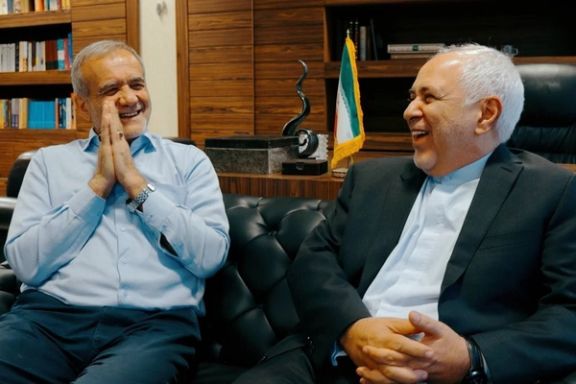Is Zarif returning to Pezeshkian’s cabinet?

A recent phone call, a tweet, and a meeting have sparked hope among supporters of Mohammad-Javad Zarif for his potential return to President Masoud Pezeshkian's cabinet.

A recent phone call, a tweet, and a meeting have sparked hope among supporters of Mohammad-Javad Zarif for his potential return to President Masoud Pezeshkian's cabinet.
Zarif announced his departure from the cabinet on August 11, less than two weeks after his appointment to the specially created position of “strategic deputy”. He further said in a tweet Wednesday that the President had “graciously” phoned him and the two had held a “sincere conversation”, but he fell short of indicating a change in his circumstances.
Twenty-four hours later, the media reported a meeting between the two men and released a short video that showed Zarif leaving the President’s office with a big smile, saying “I have always been, and will be, an admirer of Dr. Pezeshkian.”
Reformists were struck by Zarif’s resignation, which he described as ‘returning to the academia’, and his allusion to Pezeshkian’s controversial choice of a ‘Principlist’ (right-winger) close to Parliament Speaker Mohammad-Bagher Ghalibaf as his interior minister, which many supporters have criticized.
Reportedly, Pezeshkian has not yet accepted the resignation
Zarif’s meeting with Pezeshkian Thursday evening has given them hope that he and the former Communications Minister Mohammad-Javad Azari-Jahromi who campaigned tirelessly alongside Zarif for Pezeshkian will return to the cabinet.
Some media outlets in Tehran denied any rift between Pezeshkian and Zarif, attributing the latter’s resignation to his disqualification rather than a personal choice. Despite his carefully worded expression of deep dissatisfaction with the composition of Pezeshkian’s proposed cabinet, Zarif clarified that he was not leaving due to "disillusionment or disappointment."
They argued that Zarif’s appointment had to be annulled based on an “overlooked” law passed in 2022 prohibiting individuals with dual citizenship, or those whose family members are dual citizens, from being appointed to "sensitive" positions.
The ban applies to Zarif because his children were born in the United States when he was a member of the Iranian delegation at the United Nations in New York and had “acquired US citizenship”.
Many among Pezeshkian’s supporters have since appealed to him not to let Zarif go, or have expressed deep disappointment with him for allowing his departure. Others who believe Zarif resigned due to his discontent with Pezeshkian’s cabinet have appealed to him not to leave Pezeshkian alone.
Zarif would have had a very slim chance of getting a vote of confidence from the hardline-dominated Parliament if he had been proposed as foreign minister.
His appointment as deputy, for which the approval of the Parliament is not required, had initially appeared as a great initiative by Pezeshkian to give him a high position in his cabinet until the “overlooked” law came into the picture.
Referring to the obstacles Pezeshkian will be facing in choosing his men, including possible objections of security and intelligence agencies, the reformist Ham-Mihan newspaper said in an editorial Wednesday that the President not only has to lift Internet filtering but also the “filtering of human resources” that can bar his allies from his government.
“Contrary to many people’s beliefs, our governance system is very exact. For instance, it doesn’t matter what Mr. Zarif has done in the highest and most sensitive positions in the foreign ministry and how he has defended national interests in the past 46 years. What matters is what kind of passport his children who were born two decades ago when he served in the United States hold,” prominent reformist pundit Sadegh Zibakalam sarcastically said in a tweet Thursday.
An online petition addressed to Zarif launched on August 13 urged him to “stay and to steer this storm-wrecked ship to a safe shore, for the sake of the people, for the sake of Dr. Pezeshkian, and for the sake of honoring the promises that you made.” The petition was signed by 13,500 on August 16.